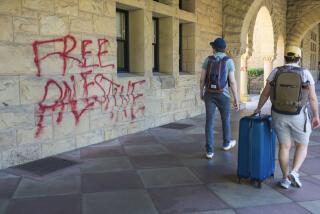New Protesters Arrested in S.F. as Previous Ones Are Arraigned
- Share via
SAN FRANCISCO — More than two dozen demonstrators were arrested Thursday even as authorities began to prosecute the 2,300 antiwar protesters taken into custody here in late March during among the largest American protests against the war in Iraq.
Although the earlier actions were spread out over the city and sparked general disruption, the target of Thursday’s protest was a single corporation: the Bechtel Group Inc., winner of a $680-million contract from the U.S. government for rebuilding Iraq.
At its 8 a.m. peak, the demonstration involved about 125 people, who held placards proclaiming, “The World Is Not for Sale” and “Shut Down the War Profiteers.” The group very briefly succeeded in blocking the giant engineering and construction firm’s main entrance.
A San Francisco Police Department spokesman said 28 protesters were arrested for trespassing but that the event was generally “sane.”
“Before, in March, the demonstrations got out of hand,” said Sgt. Neville Gittens. “This was back to what it used to be.”
Meanwhile, down the street, the first hundred of those earlier protesters were being arraigned in traffic court. In the weeks since their arrests, prosecutors have downgraded many misdemeanor charges filed against the demonstrators to traffic infractions.
Bobbie Stein, an attorney from the National Lawyers Guild, which is representing many of the arrested protesters, filed a motion with Traffic Commissioner Paul Slavit to drop all charges based on several technicalities. Stein says the charges are invalid because in most cases the police reports are incomplete and cannot place individual suspects at the scene where they were taken into custody.
During the first days of the war, thousands of demonstrators descended on San Francisco, blocking intersections and tying up traffic. Hundreds of police officers dressed in riot gear swept across the city making mass arrests for alleged failure to obey police, trespassing and other misdemeanors.
“When you conduct mass sweeps like police did on those days, you are invariably going to pick up people who are not even protesting,” Stein said. “And that’s what happened here. There are many people who did nothing that day but who still got caught up in the police net.”
In her motion, Stein also says prosecutors altered citations, crossing out the original misdemeanors and replacing them with traffic infractions. Defense lawyers say that prosecutors should have refiled the lesser offenses and that the marked-up citations are now invalid.
“They just altered the citations after people signed them, so a lot of these demonstrators are coming to court not knowing what they’re up against,” Stein said.
Slavit set a June 12 date to hear the dismissal motions.
The court threw out 31 cases because of incomplete police reports, as about 80 protesters sat quietly in the courtroom. Some wore high-top sneakers and blue jeans, dreadlocks and spiky pink hair. But not Devin Kordt-Thomas, who came dressed in a neatly pressed suit and tie.
“No matter what happened on the street,” he said, “you have to respect the court.”
Several protesters expressed dismay that their charges weren’t dropped.
Alexis English was arrested March 20 for failure to disperse. She was held for five hours that day and had to take the morning off from work Thursday to answer to the charge.
Now, however, the charge has been reduced to three counts of jaywalking, for which English faces a $266 fine. “Funny, I was on the sidewalk when I was arrested, so these jaywalking citations don’t make sense,” she said. “But if they find me guilty, I’ll pay the fine. I have to. I need my license.”
Like many others, English said her day in court has not dissuaded her from her cause.
“I’d protest again in an instant,” she said. “This whole experience has been so empowering. Civil disobedience is part of American history, and that day was not one we could just let go as business as usual.”
On Thursday, Bechtel proclaimed it a victory that business proceeded without interruption.
“Employees came to work and got to their offices,” said spokesman Jonathan Marshall. The only thing out of the ordinary, he said, was “the angry rhetoric, which our employees know from their own experience to be untrue.”
The Brass Liberation Orchestra provided musical accompaniment. A sympathizer distributed bagels from a large bag. Some protesters were in costume. Others passed out leaflets detailing what they alleged were the construction company’s “destruction, dishonesty and humanitarian disregard around the globe.”
Most of the people who passed by didn’t give the action much more than a glance.
“I’m for the protests. You’ve got to rock the boat if you want to make any difference,” said Dale Tersey, a computer consultant visiting from Arizona. “But you would need enough people to fill four or five city blocks to give the impression that corporate morality wasn’t in line with public morality.”
More to Read
Sign up for Essential California
The most important California stories and recommendations in your inbox every morning.
You may occasionally receive promotional content from the Los Angeles Times.














